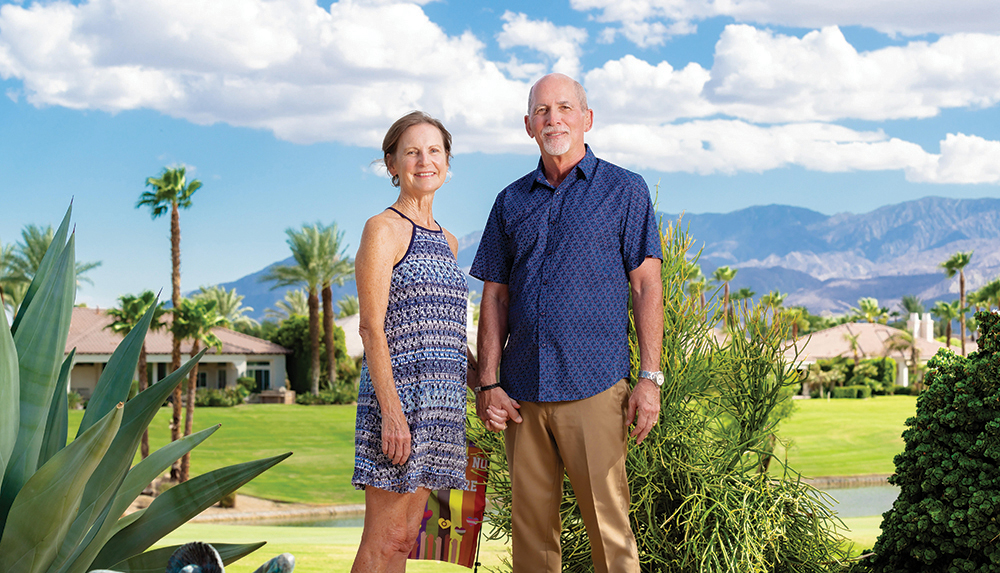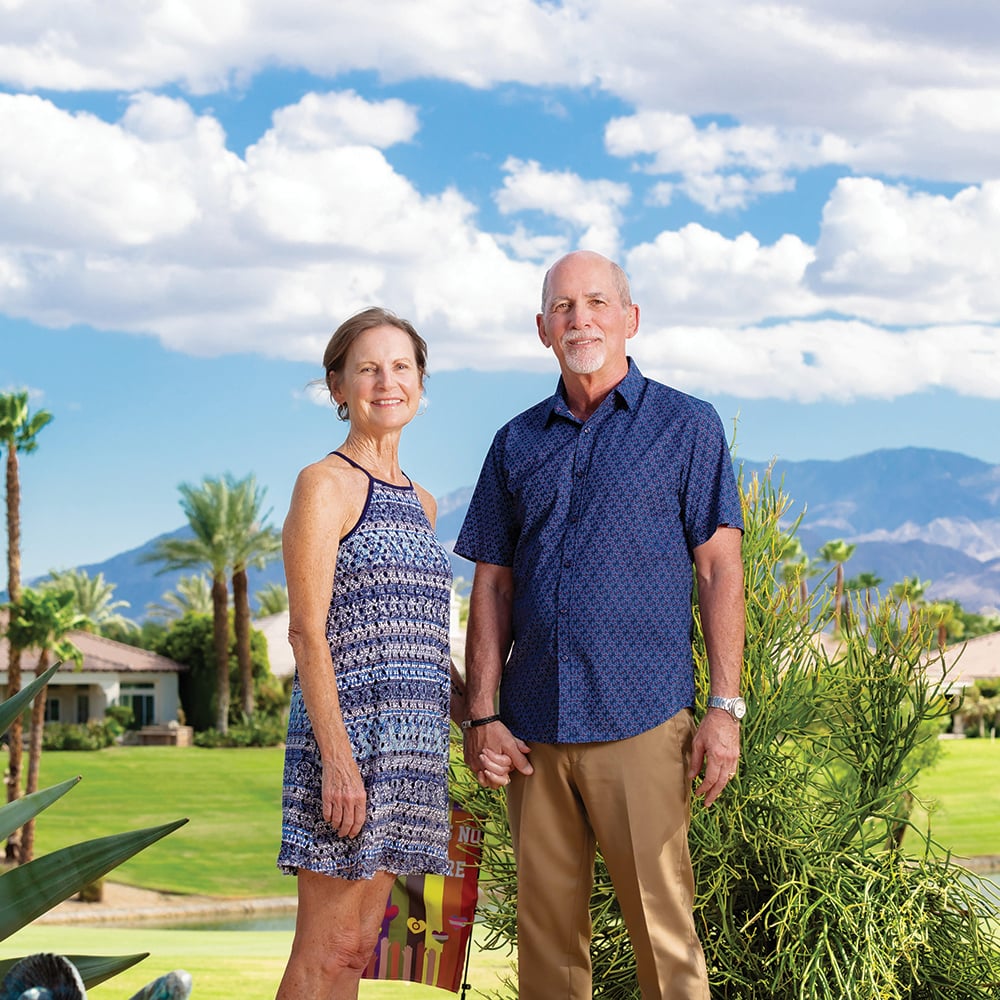
Impactful Planning
Karla Kjellin-Elder and Jeff Elder wanted to give back. Then they discovered planned giving at DAP Health and created a bona fide legacy.
As seen in Issue 4 of DAP Health magazine
Words by Greg Archer • Photo by Peter Grant
The way the light catches on the silver lettering of the Karla Kjellin-Elder & Jeff Elder Social Services Wing signage at DAP Health encourages another look. Maybe it’s the modern design — sleek, long, and lean — or the way the name spreads out so boldly along the wall. Regardless, you’re bound to notice and possibly wonder: Who are the Elders?
It’s fun keeping up with the engaging couple. In conversation, it becomes vividly apparent that Karla Kjellin-Elder and Jeff Elder have long been committed to giving back to their community. This is true as it relates to DAP Health, specifically when the couple began to mindfully plot out their estate plan. They saw all too clearly how a legacy gift assists the nonprofit in continuing to ensure the overall health and well-being of the community.
Empowering Social Services: The Impact of Legacy Gifts at DAP Health
The Elders first got involved with HIV/AIDS-related services with AIDS Services Foundation Orange County, which now is under the Radiant Health Centers umbrella. They had lived in Orange County at the time and eventually rooted themselves in the organization — Karla was extensively involved with the food pantry, while Jeff was on the board and became president. When they moved to La Quinta in 2018, they realized it was time to take a tour of DAP Health.
“It was unbelievable and overwhelming what DAP Health was doing,” admits Jeff of discovering the organization’s reach. “AIDS Services Foundation hadn’t been able to do all that yet. You saw what could really happen out here in the desert. So, we got very excited about the organization and wanted to get involved.”
The Elders began attending various galas and Partners for Life events, suddenly finding themselves among people who were passionate about helping. The more involved they became with the nonprofit, they donated their time and resources, and learned more about planned giving — specifically, opportunities for “naming rights.” DAP Health’s social services wing was brought up.
A Vision for the Future: Expanding Impact Through Planned Giving
“‘Social services’ sounded like a motherly thing,” Karla shares. “I think DAP Health strives to be a kind of family for people who may have lost theirs because of ailments or whatever. That’s very sad, to think that somebody is basically homeless, even if they have a home, because they have nobody to nurture and care for them. That’s the good thing DAP Health does — nurture the whole person, not just the ailments, not just a condition. That’s why the term ‘social services,’ to me, sounded like a big hug.”
That department at DAP Health connects clients to social services for which they are eligible. This includes ensuring individuals have access to food, housing, transportation, home health care support, and more.
“We want to give, and be part of the community,” Jeff says. “If you’re part of a community, you help make it a healthy community, a really functioning community.”
Leaving a Lasting Legacy: The Elders' Commitment to Community Welfare
They’re both quick to point out that when it came to establishing some kind of legacy gift, they wanted it to benefit DAP Health. To that end, they created their first-ever trust, and divided it into five parts — one each for their four children, and one part for a charity of their choosing. Their intention was clear. Each child would need to donate 10% of whatever they received in the inheritance to a charity of their choice, but to make the donation in the Elders’ name.
“We set up a donor-advised fund, and that fund is how we donate 90% of the money,” notes Jeff. “There are two organizations we give a lot of money to — DAP Health and The Living Desert. And so, when we pass away at some point, our children can give to various charities, and we would expect that a big portion of that will probably go to DAP Health.”
Planning it all in advance brought about a stronger sense of clarity and vision for the Elders. “To me, it’s like having or donating to a utility. It’s just something you do,” Karla says of philanthropy. “So yes, you can take your inheritance and give it to your kids, but it’s also important, I think, to have a portion of your money go to a charity, just like a portion of your income goes to a utility and a portion goes to rent.”
There are several kinds of donations accepted by DAP Health. To be sure, individuals can give money. But assets can also be considered. This can be anything from donor-advised funds, life insurance, and real estate to retirement plan assets and appreciated securities.
“There’s an entry point for everyone when it comes to planned giving,” says DAP Health Interim Chief Development Officer Chris Boone. “You can volunteer at one of our four Revivals store, you can give money, you can participate in our annual Health Equity Walk, go to a gala. There’s something for everyone.”
End-of-life conversations, however, may not always feel comfortable. “Sometimes, having those kinds of conversations can be difficult, because you’re talking about end of life and the decisions you’re trying to make,” Boone says. “But at the end of the day, the conversation is always centered around, ‘What do you want to leave, and what do you want to be remembered for doing in this world?’ Planned giving is all about impact, and helping others in your community.”
Moving forward and into 2024, Boone says he and the DAP Health team are excited about new possibilities that have emerged. In addition to sharp attention on planned giving, the goal is to have the organization’s Vision Forward capital campaign wrapped up in the next year, which, he says, “is a fantastic milestone. We can’t wait to celebrate our success thanks to donors like the Elders.”
Another significant opportunity to expand DAP Health’s impact is the recent acquisition of the Borrego Health system, which saw the nonprofit go from serving 10,000 patients a year at two locations in the Coachella Valley to more than 100,000 patients a year at 25 clinics located throughout 240 rural and urban zip codes from the Salton Sea to San Diego. The list of services offered now includes OB-GYN, pediatrics, urgent care, pharmacy, and veterans’ health — all of which will be covered under DAP Health. “We’re really excited about it because it really opens the door to a whole new community of folks to help. And that’s going to be huge. It’s a big thing to chew on,” Boone notes.
The Elders admit they were nicely taken aback when they first saw their names on the wall at DAP Health. Deep down, it felt like a full-circle moment for the couple, who have long been donating their time and resources to charitable organizations, and, in turn, making an impact.
“We tell people, ‘If you have money, give money. If you have time, give time. And if you have both, give both,’” states Jeff. “We’ve been fortunate. Some people hoard their money, so that when they die, their kids have this giant inheritance. We gave our kids a good education and raised them well. And they seem like they’re OK. Our plan really is about getting as much as we can out of life while we’re still alive, but whatever is left, a big piece of that should still go to charity because we really should be helping.”
Learn more about planned giving at PlannedGiving.DAPHealth.org.









